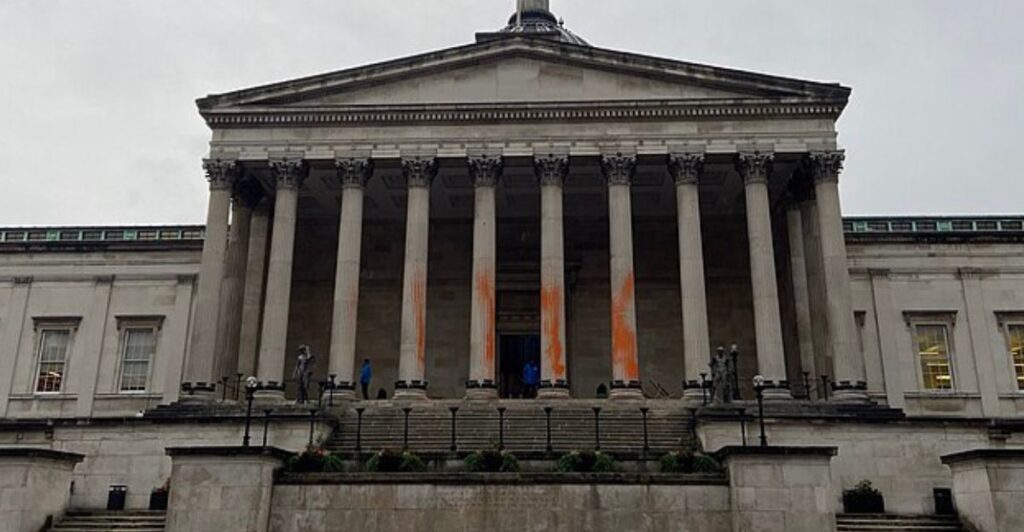
Just Stop Oil has had three years of disruptive activism, but recently, it has been announced that they are, at least somewhat, stepping back and ending their high-profile action campaigns. The organization was founded in February 2022 and its goals were to force the United Kingdom’s government to stop new fossil fuel licensing and further similar practices. Fast forward to present day – April 2025, and its goals have seemingly been met.
New government policies introduced since the organization’s inception have been put in place, banning new oil and gas licenses. The group has had their victories, including keeping over 4,4 billion barrels of oil in the ground and aided the outcome of court rulings against new fossil fuel projects.
However, the end if their direct actions have raised questions about whether or not this marks a victory for the organization or if its a strategic reprioritization in the rapidly evolving fight against climate change.
JSO

Just Stop Oils (JSO) started as part of a bigger wave of climate activism inspired by other environmental movements, such as Extinction Rebellion (XR) and their radical flanking effect, where extreme tactics were employed to amplify moderate voices. This inspired JSO to start their disruptive protests.
JSO is responsible for many radical movements over the years and is responsible for disruptive protests such as blocking traffic and throwing soup on Van Gogh’s paintings. These actions garnered global attention, both good and bad.
Their methods have sparked widespread criticism as their actions are, in many cases, considered vandalism and extreme reactions. Their methods may mirror historical radical movements that faced backlash, such as the civil rights movement’s interplay between Martin Luther King Jr.’s moderation and Malcolm X’s militancy.
Impact

The impact that JSO has had over the years is undeniable. Their activism has aided in policy changes that are close to their core goals, such as ending new fossil fuel licensing. New legislation has ruled against oil and gas projects, and public discourse surrounding climate change is growing louder.
The efforts of JSO have also claimed that they have brought-to-light systemic corruption in legal systems that favor industries that use fossil fuels. Their controversy has only served as a way of garnering more attention, and raising awareness through their issues.
Over 3,300 members of JSO have been arrested, and 180 activists have been imprisoned over the years. Despite this, JSO has not backed down from its extreme activism until now, demonstrating radical political shifts and the power of civil resistance.
Challenges

As an organization with extreme activism, significant roadblocks and challenges have been presented since its inception. Public opinion on the group has often been in a negative light due to its extremist approach and disruptive tactics. Actions such as activists gluing themselves to artworks and blocking traffic are seen as counterproductive and inconveniencing the wrong people.
Legal pressures have also presented obstacles for the organization as governments introduce more extreme penalties for nonviolent protests. Momentum can also be hard to maintain as the organization relies on small donations and limited resources.
Internal divisions over strategy have also been brought up as a recurring issue within the company. These challenges highlight a broader problem in activism across the world, as maintaining cohesion and support from different entities is vital for success.
A Pivot

JSO has announced that they will stop taking direct action in the name of activism. This pivot is not an admission of defeat but a reprioritization according to the organization. JSO aims to adapt to the new conservation climate and use less controversial strategies such as the ones they have used in the past.
They will continue to advocate climate justice through other methods, like public awareness campaigns and other legal methods. This change shows that the organization has to evolve as the laws and opinions on climate change do. They aim to provide systemic engagement over attention-grabbing spectacles.
These transitions are not uncommon in social movements that aim for long-term sustainability and outreach. Short-term disruption is being replaced with long-term influence, and the pivot may be an indicator of more diverse tactics.
Other Viewpoints

While JSO have been clear in their new objective, and some climate organizations and public voices have praised the transition as a more sustainable way forward, critics have argued that disruptive tactics are still necessary to evoke change. Many believe that JSO’s retreat is premature amidst projections suggesting that by the 2030s, global heating could reach unprecedented levels.
Other groups feel that their disruptive tactics in the past only served to alienate them from potential benefactors and other allies and took productive dialogues off the table. There should be a delicate balance maintained between urgency and inclusivity in the fight against climate change.
A study from the Harvard Business Review has shown data that suggests that radical activism can polarize public opinion, limiting the effectiveness and goal of the movement.
Historical Movements

The pivot that JSO is undertaking could have implications for both new activism and government regulations. New activist groups could be inspired by JSO’s legacy and try to carry over the torch to continue their disruptive activism. Government legislation could pivot as well, adopting stricter laws against protests.
Historically, radical movements would usually evolve once the need for disruptive tactics was no longer needed. These movements would change into more effective catalysts that empowered systemic change after their disollution.
An example of historical movements JSO mirror were anti-Aparthied movements in South Africa, often being radical and disruptive, these movements changed into diplomatic efforts as the social climate evolved. Ultimately, goals were met through a mixture of disruptive and more intuitive efforts.
Other Effects

There are long-term implications that come along with the JSO’s ongoing fight in activism. Societal norms regarding environmental responsibility could have shifted, and JSO’s legacy of high-profile protests could have had an impact on cultural change.
As the climate crisis evolves, there are many implications not only for human industries and our quality of life but that of all life on our planet. Habitats and ecosystems rely on a delicate balance and interconnectivity of animals and plants.
Climate change could change these ecosystems radically, as all it takes is a slight temperature change to shrink existing habitats and eventually knock out a species. With the reduction of one animal population, plants could grow rampant, and keystone predators would diminish as well.
Radical Disruptions Is Sometimes Needed

As history teaches us, radical movements are often needed when there is complacency within a government and societal system in the face of greater issues. These radical approaches must be adapted to the current climate and evolve with modern-day strategies.
JSO’s goals and legacy seem to align with historical movements, as their success with their radical disruptions and activism has already had systemic change, and now they are stepping down to refocus their efforts to more cohesive and collaborative campaigns. Just as the anti-Apartheid movement and the suffrage movement that came before it, they both align similarly to the way the JSO is conducting themselves.
Awareness of the organization and what they have been fighting for has already been raised through their radical and attention garnering protests. Now, their pivot has reflected pragmatism and an effort for a sustainable impact.
A Transformative Approach

The JSO’s folding is not the end for activism, and is rather a transformative approach in an ever-evolving world in the fight for climate activism. Their legacy showcases their ability to reshape policies and public awareness in the past.
Their pivot highlights challenges, such as disruptive efforts are limited without sustained institutional engagement. Governments may falter to address the climate crises and JSO will continue to find ways to foster activism while dropping their disruptive legacy.
The future of climate activism will most likely need a diverse mixture of radical actions when it is needed, and strategic engagement after voices have been heard.
Explore more of our trending stories and hit Follow to keep them coming to your feed!

Don’t miss out on more stories like this! Hit the Follow button at the top of this article to stay updated with the latest news. Share your thoughts in the comments—we’d love to hear from you!







